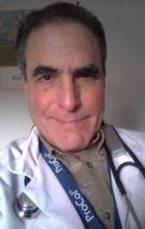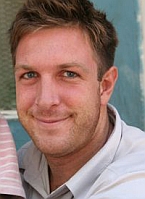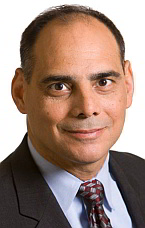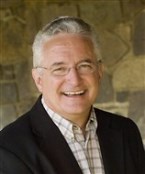Search Results
To Listen to Audio click the Play Button [beneath each segment] which varies based on the browser you are using.
October 30, 2014
Title: Taking the Lead on Ebola
Topic: Ebola
Discussed by Dr. John O'Shea
with The Heritage Foundation (www.Heritage.org)

Doctors in America should be taking the lead on the fight against Ebola
around the world. Dr. John O’Shea says that the response to the Ebola outbreak
in Africa has not been addressed properly. So what’s the big deal with Ebola?
Are people just ill-informed and panicked? Is there really a cause for concern
in America? There is a real threat, but is it serious?
Approximately 50,000 Americans die every year from the flu. With flu season in
full-swing, many people might become terrified, thinking they have Ebola because
the symptoms are often similar to the flu. According to Dr. O’Shea, if you have
not traveled recently, the chances are slim; your chance of contracting Ebola
from someone who is infected is even smaller.
Dr. O’Shea also discusses the recent appointment of a non-medical professional
to oversee the Ebola situation in America. What was Obama thinking? Also, should
healthcare workers, soldiers, and those who have traveled to Ebola infected
countries be automatically quarantined? What can we do to protect ourselves and
our families?
John O’Shea is a visiting fellow in the Center for Health Policy Studies at
The
Heritage Foundation. He has been a practicing general surgeon for more than 20
years and was formerly a senior health policy advisor for the House Committee on
Energy and Commerce.
More from this Guest More on this Topic More from this Organization
Title: CDC Gets an "F" from the President of the AAPS
Topic: Ebola
Discussed by Dr. Richard Amerling
with Association of American Physicians and Surgeons (www.aapsonline.org)

The CDC was created to
protect the American people. Over the years, however, it seems as though
politics has gotten in the way of the CDC’s original purpose. In fact, Dr.
Richard Amerling, the President of the Association of American Physicians and
Surgeons, says the head of the CDC looks like he’s being forced at gunpoint to
tell the American people that Ebola is not a threat to the United States. Dr.
Amerling says the CDC is simply not doing its job. Period.
Dr. Amerling was absolutely astounded when Obama and the “experts” said that a
no-fly, no-travel ban to and from Ebola-ravaged countries is not necessary and
would do more harm than good. Dr. Amerling disagrees with this 150%! The only
way Ebola can be contained is by quarantining the infected areas and not
allowing people to leave, especially by airplane to all corners of the globe.
Dan Henninger wrote in the Wall Street Journal about “Killer Bureaucracies”:
“Ebola, the Secret Service, Veterans Affairs, Obamacare rollout, the Centers for
Disease Control, the World Health Organization, and the Federal Emergency
Management Agency. Behind all these names are federal bureaucracies that are
supposed to protect people or help them. Instead of helping, are they putting
individuals at risk – or worse, our County at RISK?” Dr. Amerling responds to
this statement.
Dr. Amerling also explains how hospital staff need more training to be better
prepared. Right now, if one Ebola patient enters a hospital ER, half the system
is shut down because the patient needs constant care and supervision, not to
mention the quarantining and sterilization involved.
How can we, as Americans, be more proactive in helping the physicians and aid
workers in Africa who are fighting Ebola on the front lines? Listen in as Dr.
Amerling shares how you can help. Log on to www.AAPS.org for more on this and
other health issues.
More from this Guest More on this Topic More from this Organization
October 29, 2014
Title: Fighting Ebola with Salt and Electricity
Topic: Ebola
Discussed by David Darg
with Operation Blessing International (www.OB.org)

David Darg, Vice President of International Operations with Operation
Blessing, has been on the front line fighting Ebola in Liberia. Operation
Blessing has been using salt, water, and electricity to produce sodium
hypochlorite for years in third world countries to help clean and disinfect. In
America, it’s even used to purify our tap water. And now the solution is being
sent throughout Liberia to combat Ebola.
David Darg met recently with the President of Liberia, explaining the benefits
of sodium hypochlorite and why more facilities need to be using the solution.
In fact, Operation Blessing established the first ever chlorine generation
facility in the country of Liberia and has produced more than 3,300 gallons of
the disinfectant, which kills Ebola on contact.
Listen in as David Darg explains why shipping liquid chlorine, or sodium
hypochlorite, is unfeasible, thus making it necessary to construct the facility
and use equipment, water, electricity, and salt to make their own liquid
chlorine. Operation Blessing needs your help with this. Obviously, it is very
expensive to ship this equipment and the supplies to Liberia and even more
expensive to produce the solution. Log on to
www.OB.org to see how you can help combat Ebola right from your home
or office.
More from this Guest More on this Topic More from this Organization
October 15, 2014
Title: ENT Doc says the U.S. is Not Prepared for Ebola
Topic: Ebola
Discussed by Dr. Elaina George
with National Center for Public Policy Research (www.NationalCenter.org)

How contagious is Ebola? Dr. Elaina George says that most Americans do not
have a robust, healthy immune system. We may think we do, but we really don’t.
In fact, she says: "We eat processed foods, we don't sleep well, we don't take
care of ourselves, and we're living under a great deal of stress, and by
definition that will all affect the immune system."
The CDC is saying they are “absolutely certain” Ebola is not an “airborne
disease”. Dr. George says that, when it comes to diseases, you can never be
“absolutely certain” because they are constantly changing and adapting to their
environment. In fact, Ebola has already mutated about 400 times!
No one is exempt when it comes to Ebola. No one. Even if the infected person is
not showing symptoms, Ebola can still be passed from person to person.
Dr. Elaina George is an Ear Nose and Throat Physician with a wealth of
information about Ebola and the Enterovirus D68. Today, she is here to discuss
some useful guidelines to help keep you and your family safe and healthy. She
even recommends that you have plenty of supplies on hand in case of a quarantine
– food, water, medicine, gas for cars, cash on hand.
Dr. George also suggests that the US immediately execute measures to delay or
stop travel from countries where outbreaks have occurred or quarantining people
who do travel from those countries. You can find Dr. George at
www.DrElainaGeorage.com or
www.PeachTreeCenter.com.
More from this Guest More on this Topic More from this Organization
Title: Ebola: Where did it Come From?
Topic: Ebola
Discussed by Dr. Christian Brugger
with Culture of Life Foundation (www.CultureOfLife.org)

Talk about Ebola is all over the
news, social media, and radio. People think it is this new, scary virus that we
know nothing about. However, researchers and doctors have known about Ebola
since 1976. Over the past 40 years, there have been 33 Ebola outbreaks
worldwide, with approximately 2,500 cases and 1,500 deaths. What? You didn’t
know that? Most people don’t! There are also four different strains of Ebola,
none of which have a tried-and-true vaccine or treatment.
We have cures for many, many viruses and diseases. Why not Ebola? There is a
vaccine that has been tested successfully on primates since 2000 who have
contracted Ebola. Why not humans? Dr. Christian Bruggar argues that if Ebola had
broken out in San Francisco or London or Houston, billions of dollars would have
been invested into finding a cure. Since it’s concentrated at the moment in
South Africa, the western world doesn’t seem to care.
Dr. Bruggar discusses some ways to contain the current worldwide outbreak, how
people can protect themselves from the virus, and how he thinks the United
States government should be handling the situation. Log on to
www.CultureOfLife.org for more on this and other issues.
More from this Guest More on this Topic More from this Organization
Title: Part 2 of 2 - Ebola: Just the Facts. No Fiction.
Topic: Ebola
Discussed by Dr. Jane Orient
with Association of American Physicians and Surgeons (www.aapsonline.org)
Dr. Jane Orient says that Ebola
is an “equal opportunity disease”. It can be transmitted with one simple cell.
One. Simple. Cell. If it can happen in apes and pigs, it can happen in humans.
It doesn’t only occur during “risky behavior” or “unsafe behavior”. In her
opinion, Ebola should be considered an airborne virus.
Facts about Ebola:
1.
In Africa, the virus is killing between 50-70% of the infected people. It is
doubling every 3 weeks.
2.
The former Soviet Union attempted to use Ebola as a biological weapon.
3.
Ebola and AIDS are both zoonotic diseases, meaning they exist in human and
animals.
4.
Ebola infects animals, including dogs, but they do not show symptoms or become
sick for the virus.
Dr. Jane Orient agrees with our former guest, Dr. Elaina George, concerning the
government’s role is stopping the spread of the Ebola virus. She believes that
people leaving the African region where the outbreak is occurring should not be
allowed on an airplane, let alone allowed to enter the country. She also agrees
that hand-washing, sanitation of public counters and tables, and avoiding
crowded public places are key to staying healthy.
More from this Guest More on this Topic More from this Organization
October 9, 2014
Title: Ebola: Where did it Come From?
Topic: Ebola
Discussed by Dr. Christian Brugger
with Culture of Life Foundation (www.CultureOfLife.org)

Talk about Ebola is all over the
news, social media, and radio. People think it is this new, scary virus that we
know nothing about. However, researchers and doctors have known about Ebola
since 1976. Over the past 40 years, there have been 33 Ebola outbreaks
worldwide, with approximately 2,500 cases and 1,500 deaths. What? You didn’t
know that? Most people don’t! There are also four different strains of Ebola,
none of which have a tried-and-true vaccine or treatment.
We have cures for many, many viruses and diseases. Why not Ebola? There is a
vaccine that has been tested successfully on primates since 2000 who have
contracted Ebola. Why not humans? Dr. Christian Bruggar argues that if Ebola had
broken out in San Francisco or London or Houston, billions of dollars would have
been invested into finding a cure. Since it’s concentrated at the moment in
South Africa, the western world doesn’t seem to care.
Dr. Bruggar discusses some ways to contain the current worldwide outbreak, how
people can protect themselves from the virus, and how he thinks the United
States government should be handling the situation. Log on to
www.CultureOfLife.org for more on this and other issues.
More from this Guest More on this Topic More from this Organization
October 3, 2014
Title: Ebola: The Facts and the Fiction
Topic: Ebola
Discussed by James Carafano
with The Heritage Foundation (www.Heritage.org)

In 2013, 3 Billion people boarded planes and flew somewhere in the world.
That’s a lot of people! How does this effect airborne diseases and other
viruses, specifically Ebola? Every time a person is diagnosed with Ebola, two
are infected. That multiples to four, then to eight, and so on. James Carafano
is a national security and foreign policy expert. He has some answers on the
Ebola case in Texas.
First, there is a difference between an outbreak, an epidemic, and a pandemic.
There is a time to be concerned and a time to panic (calmly). Some may be too
young to remember, but the HIV/AIDS pandemic was a scary time. But look at the
flu virus. It is very easy to catch the flu, yet there are no restrictions for
travel if you have the flu. Ebola, according to James Carafano, falls somewhere
in between HIV/AIDS and the flu.
The confirmed Ebola case in Dallas, Texas, is disturbing for many reasons. The
patient was honest with hospital staff concerning where he was from (Liberia),
yet they didn’t check him for the Ebola virus the first time he visited the ER.
He was simply sent home with medication only to return again four days later.
There are even reports that he had contact with school-age children. Regardless
of who is to blame, the fact remains that this should never have happened. And
now we have Ebola in America.
Listen in as James Carafano, with the Heritage Foundation, explains more about
Ebola, travel, and precautions we can take to protect ourselves.
More from this Guest More on this Topic More from this Organization
August 7, 2014
Title: What is Ebola?
Topic: Ebola
Discussed by Dr. David Stevens
with Christian Medical and Dental Association www.CMDA.org

Part 1 of 2
There has been quite a lot of chatter about the doctor and nurse who have
been transferred to Atlanta from Africa. The two have the Ebola virus.
But, what is Ebola? How contagious is it, really? Dr. David Stevens is the CEO
of the Christian Medical and Dental Associations, the nation’s largest
faith-based association of healthcare professionals.
Listen in as he explains
the symptoms, incubation period, and how likely it is (or isn’t) to spread.
More from this Guest More on this Topic More from this Organization
Title: Part 2 of 2 - What is Ebola?
Topic: Ebola
Discussed by Dr. David Stevens
with Christian Medical and Dental Association www.CMDA.org
Many people are calling Dr. Kent
Brantley, the infected doctor, a hero. Dr. Stevens says he is not a hero. He is
simply living out a normal Christian life, serving others.
Dr. Stevens knows Dr. Kent Brantley personally. He describes Dr. Brantley as a
compassionate, Christian man with a heart for the less fortunate. Dr. Brantley
and his wife were following the call God placed on their lives when they moved
to Africa.
Are his action commendable? Yes.
Are they heroic? No.
More from this Guest More on this Topic More from this Organization